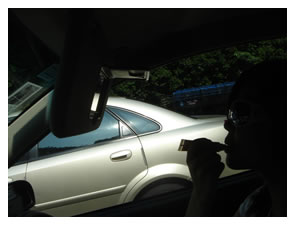Are women really bad drivers?
09 Oct 2007|44,673 views
 I jammed hard on my brakes. The green Honda Civic had suddenly cut into my lane without signaling, and I was forced to react quickly to avoid a collision. "Must be a woman," my male passenger stated matter-of-factly.
I jammed hard on my brakes. The green Honda Civic had suddenly cut into my lane without signaling, and I was forced to react quickly to avoid a collision. "Must be a woman," my male passenger stated matter-of-factly. Yes, we've all heard it before. Women can't park. They drive on the rightmost lane of the expressway at 60km/h. They can't tell left from right. They put on their makeup while driving. This is the typical image of the female driver that is often bandied about, but how accurate is it?
5 out of 10 drivers polled in an informal survey felt that women are generally bad drivers, while the remainder disagreed. Interestingly, the number of women and men were equally split on either side.
Common complaints about women drivers include driving too slowly, being unobservant and careless, and having slow reaction times. "Women are too tentative when they change lanes," Shawn, 25, says, "slow, just a bit unaware on the road, causing inconvenience, a bit blur blur." Many feel that women have poorer navigation skills and do not judge distances as well as men.
Scientific evidence seems to support this. Studies conducted by scientists from the University of Giessen, Germany, have shown that women achieved lower scores in tests that measured their spatial skills, as compared to their male counterparts. This may be caused by a lack of testosterone in the womb, which they say may adversely affect spatial ability. Such spatial ability includes the ability to assess spaces and judge distances, skills which are essential to driving.
Yet statistically speaking, women are less prone to getting into accidents than men are. Data from the U.S. Department of Transportation's Fatality Analysis Reporting System shows that about 73% of all people killed in car accidents are male, almost 3 times the number of women. Even taking into account driving distances (which are longer for men than for women on average), the number of men killed in car accidents is 70% higher than that of women.
 This could be due to the fact that men have a higher tendency to engage in aggressive, risk-taking behaviour, and tend to be less patient than women. Statistics from research conducted at the University of Hawaii show that men are more likely to exceed the speed limit than women and change lanes without signaling. They are also twice as likely to make illegal turns and three times as likely to cut other drivers off. Alcohol use may be another contributing factor. In 2003, for example, 27% of the male drivers in fatal crashes had been drinking, whereas only 12.5% of the female drivers had done so.
This could be due to the fact that men have a higher tendency to engage in aggressive, risk-taking behaviour, and tend to be less patient than women. Statistics from research conducted at the University of Hawaii show that men are more likely to exceed the speed limit than women and change lanes without signaling. They are also twice as likely to make illegal turns and three times as likely to cut other drivers off. Alcohol use may be another contributing factor. In 2003, for example, 27% of the male drivers in fatal crashes had been drinking, whereas only 12.5% of the female drivers had done so. Even Shawn concedes that "guys also cause inconvenience on the roads sometimes, usually because they don't care." In fact, the conventional notion that men are better drivers may actually cause them to overestimate their supposedly superior spatial skills, ironically disproving that very notion. "I think it's just a really stale stereotype," says Delphia, 22, "I look around at the girls I know™ they're all steady drivers."
Ultimately, it is difficult to generalize. Men and women each have different skill sets and personality traits that all contribute to their behaviour on the roads. Perhaps Jiaxiang, 24, sums it up best when he says, "I've seen plenty of bad female drivers, but the best driver I know is my mom."
 I jammed hard on my brakes. The green Honda Civic had suddenly cut into my lane without signaling, and I was forced to react quickly to avoid a collision. "Must be a woman," my male passenger stated matter-of-factly.
I jammed hard on my brakes. The green Honda Civic had suddenly cut into my lane without signaling, and I was forced to react quickly to avoid a collision. "Must be a woman," my male passenger stated matter-of-factly. Yes, we've all heard it before. Women can't park. They drive on the rightmost lane of the expressway at 60km/h. They can't tell left from right. They put on their makeup while driving. This is the typical image of the female driver that is often bandied about, but how accurate is it?
5 out of 10 drivers polled in an informal survey felt that women are generally bad drivers, while the remainder disagreed. Interestingly, the number of women and men were equally split on either side.
Common complaints about women drivers include driving too slowly, being unobservant and careless, and having slow reaction times. "Women are too tentative when they change lanes," Shawn, 25, says, "slow, just a bit unaware on the road, causing inconvenience, a bit blur blur." Many feel that women have poorer navigation skills and do not judge distances as well as men.
Scientific evidence seems to support this. Studies conducted by scientists from the University of Giessen, Germany, have shown that women achieved lower scores in tests that measured their spatial skills, as compared to their male counterparts. This may be caused by a lack of testosterone in the womb, which they say may adversely affect spatial ability. Such spatial ability includes the ability to assess spaces and judge distances, skills which are essential to driving.
Yet statistically speaking, women are less prone to getting into accidents than men are. Data from the U.S. Department of Transportation's Fatality Analysis Reporting System shows that about 73% of all people killed in car accidents are male, almost 3 times the number of women. Even taking into account driving distances (which are longer for men than for women on average), the number of men killed in car accidents is 70% higher than that of women.
 This could be due to the fact that men have a higher tendency to engage in aggressive, risk-taking behaviour, and tend to be less patient than women. Statistics from research conducted at the University of Hawaii show that men are more likely to exceed the speed limit than women and change lanes without signaling. They are also twice as likely to make illegal turns and three times as likely to cut other drivers off. Alcohol use may be another contributing factor. In 2003, for example, 27% of the male drivers in fatal crashes had been drinking, whereas only 12.5% of the female drivers had done so.
This could be due to the fact that men have a higher tendency to engage in aggressive, risk-taking behaviour, and tend to be less patient than women. Statistics from research conducted at the University of Hawaii show that men are more likely to exceed the speed limit than women and change lanes without signaling. They are also twice as likely to make illegal turns and three times as likely to cut other drivers off. Alcohol use may be another contributing factor. In 2003, for example, 27% of the male drivers in fatal crashes had been drinking, whereas only 12.5% of the female drivers had done so. Even Shawn concedes that "guys also cause inconvenience on the roads sometimes, usually because they don't care." In fact, the conventional notion that men are better drivers may actually cause them to overestimate their supposedly superior spatial skills, ironically disproving that very notion. "I think it's just a really stale stereotype," says Delphia, 22, "I look around at the girls I know™ they're all steady drivers."
Ultimately, it is difficult to generalize. Men and women each have different skill sets and personality traits that all contribute to their behaviour on the roads. Perhaps Jiaxiang, 24, sums it up best when he says, "I've seen plenty of bad female drivers, but the best driver I know is my mom."










